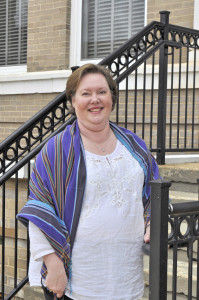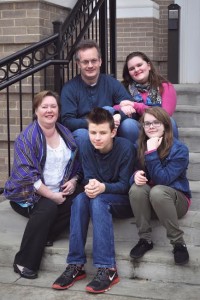Today’s spotlight features Lori, who finds hope for the future in the changes she has already seen in the church and in the answers she receives to her prayers assuring her that more is yet to come.

Tell us about your connection to Mormonism.
On my mother’s side, my ancestors joined the church mostly in Kirtland and then all came west to Utah in the 1850s. They stayed out west. On my father’s side, my grandmother from Georgia was the first to join the church as a teenager. My grandfather joined before my father was old enough to be baptized. So, I’ve always been LDS. I grew up in Arkansas, where my local congregation was very small. So small, in fact, that we called it not a branch, but a twig. I was the only Mormon in my high school and almost could not believe it when I got to BYU as a freshmen and saw thousands of Mormons walking around campus.
What are some of the things you love about the Church? Have you had a favorite calling in the church?
I love the striving for good and the sense of being part of something bigger than any individual. I’ve held just about every calling available to a woman in the LDS Church and I’ve liked a lot of them. What I like best is working with good people and having autonomy in what we do. Serving in Relief Society Presidencies seems to provide that opportunity most often. I have been in Primary and YW presidencies at both the ward and stake level, but the RS presidency operates a bit more independently than Primary or YW, so I like that better.
Aside from ordination, what are some changes you would like to see implemented immediately in the Church?
I would like to see more women in leadership positions. We need women in positions not just to give counsel to male leaders, but to be the ones making decisions, either independently or jointly. Men and women have different strengths; I believe the LDS Church would be a much stronger institution if women and men made more decisions jointly.
What are some examples of gender inequality you see in the Church?
Real leadership roles are all given to men. Starting with the bishopric, then the high council, stake presidency, and so on, there are variety of ways for men to be part of real decision-making, serving, and connecting with other church leaders. None of these same opportunities exist for women. I have also seen how I am not treated as an equal partner with my husband in many instances in church.
How did you discover Ordain Women?
I have known one of the original board members for several years and was one of the first people she approached to submit a profile. I hesitated initially, because even though I have believed my entire adult life that women would one day be ordained, I had never discussed it publicly and wasn’t at all sure that going public on the internet was the right choice. Once I read the initial profiles and realized just how Gospel-centered they were, I quickly added mine.
What prompted you to put up your profile?
My father and I discussed ordination of women from the time I was a teen. I remember him specifically telling me that in all his scripture study, he had never found any more evidence prohibiting ordination for women in the scriptures than what had been appropriated to deny black men the priesthood prior to 1978. He was sure that women would one day be ordained, though it appears from some discussions I have had with priesthood leaders who served with him at that time, that he did not discuss these thoughts with any of them. They were private and shared only with his family. But he convinced me that I would only need to be patient and that ordination to the Priesthood would one day happen for women. The answers to personal prayers about female ordination were always met with the admonition to “be patient”. At least until Oct. of 2013 when the answer was that the time had come to act.
How have people close to you reacted to your advocacy for women’s ordination?
I have been lucky and most reactions have been positive. I have no family or close friends outside of LDS feminist circles who have posted profiles, but they are mostly supportive of me and what I do. Some agree with me that women will be ordained, but do not believe in activism. Others see inequality that needs to be addressed, but do not believe ordination to the priesthood is necessary to achieve it. And others are just fine with the way things are. With the occasional exception, I have received support from my family.
Have your feelings grown or changed since submitting your profile?
I am much braver about speaking what I believe. I no longer pretend I do not believe women will be ordained and I am convinced that part of my role here on earth at this time is to be a voice for change in this area. It has been difficult at times to maintain full church involvement when accusations from strangers and some friends and even church leaders have been judgmental and harsh, but I am continually blessed with reassurances from my heavenly parents that I am where I should be and that this church is the right vehicle for salvation and that they understand my difficulties. I am the recipient of lots of tender mercies, for which I am very grateful.
Have you had the opportunity to attend any actions? How did they affect you?
I attended the first priesthood session action in Oct. 2013. It was an amazing experience from beginning to end. I wrote about it on the OW blog when it happened, so I won’t detail it all here, but I felt the love and support of my heavenly parents the entire journey encouraging me. What to me was the most incredible part was that though I was apprehensive about flying halfway across the country to Utah and then showing up at a public park that I wasn’t even sure how to find to be met by mostly people I had never before met face-to-face, the minute I arrived and met others I felt at home. People seemed familiar.
Do you see the perception of OW changing with ward members/family/friends?
I’m not sure that the perceptions of OW have changed much, but the awareness of inequalities for women are noticed more and more people are willing to discuss those and how to change them. I have many friends and family who are working on eliminating these inequalities in ways other than being involved with OW.





